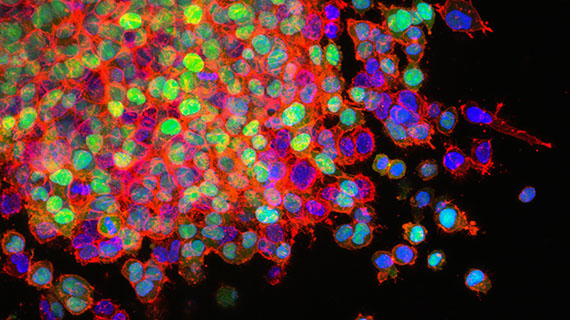|
|
|
|
 (Photo by National Cancer Institute on Unsplash)
Findings will guide improvements to CAR T-cell therapy for breast, lung, brain cancerA Wilmot Cancer Institute team has discovered the molecule responsible for guiding T cells toward tumors, setting the stage for scientists to improve upon the groundbreaking treatment.
Immunotherapy, particularly CAR T-cell treatment for cancer, is extending the lives of many patients. But sometimes the therapy randomly migrates to places it shouldn’t, tucking into the lungs or other noncancerous tissue and causing toxic side effects.
The next step in the research is to find a drug that can manipulate the key T-cell protein, ST3GAL1, says Minsoo Kim, coleader of Wilmot’s Cancer Microenvironment research program, and corresponding author of an article in Nature Immunology on the work. If the investigation evolves as planned, such a drug could be added to the CAR T-cell regimen to ensure that T cells hit their targets, Kim says.
His lab is collaborating with other Wilmot investigators to screen for drugs that will accomplish that feat, while also minimizing the risk of life-threatening side effects.
“You can create very powerful treatments,” says Kim, “but if they can’t get to their targets or they go to the wrong place, it does not provide the outcome you intended.”
Read how the findings could refine this “living drug.”
Brain performance while walking may signal ‘super aging’
Some older adults have improved brain performance when they combine a cognitive task with walking, report researchers at the Del Monte Institute for Neuroscience.
“Identifying super-agers will leverage what we understand about the brain and aging,” says Eleni Patelaki, a biomedical engineering PhD student at the University of Rochester and the first author of the paper in NeuroImage. “But this is difficult to do because, in this case, there was no external evidence of this ability, and people are unaware that their brain is working differently.”
Researchers had the participants complete the same cognitive task while sitting and while walking. The 37 men and women, ages 62 to 79, scored similarly while sitting. When the same group repeated the test while walking, researchers found some individuals improved their cognitive performance.
“We think this brain activity might constitute signatures of ‘super-aging,’ ” says Patelaki.
Learn more about these “super agers.”
Machine-learning ultrasound improves breast cancer detectionMammography is the gold standard for breast cancer diagnosis, but it’s not reliably accurate in all cases, especially in people with dense breasts. Avice O’Connell, a professor of imaging sciences at the University of Rochester Medical Center, and Kevin Parker, a professor of electrical and computer engineering at the Hajim School of Engineering & Applied Sciences, wanted to do better. Along with Jihye Baek, a PhD student in electrical and computer engineering, they launched a research project incorporating ultrasound with machine learning for previously detected masses. The end result: nearly 98 percent accuracy in predicting breast cancer in these masses.
The sensitivity of mammography can range from 40 percent for dense breast tissue to a high of just above 90 percent. “While 90 percent sounds good, a higher accuracy rate means we can help many more women,” says Parker.
The findings were published last November in the journal Machine Learning: Science and Technology.
Read more about this use of artificial intelligence.
Undergraduate Research Expo features work from 112 Rochester students
C. Rose Kennedy, assistant professor of chemistry (L) listens as Hafsa Mohamed ’24 (chemistry) describes the poster presentation “The Reduction of CO2 to CO using a Synthetic Biocatalyst.” (Photo by J. Adam Fenster / University of Rochester)
The College’s 2023 Undergraduate Research Exposition took place April 14 at the Goergen Athletic Fieldhouse and featured poster presentations from 112 University of Rochester students.
The afternoon session included posters from the disciplines of humanities, natural sciences, engineering and mathematics, and social sciences. Topics ranged from the impact of World War I on the field of psychiatry and Margaret Fuller’s poetry and prose, to the debilitating bone disease Staphylococcus aureus osteomyelitis and emotional awareness in children with fetal alcohol spectrum disorders.
Selected students received awards in categories for the President’s, Dean’s, and Professors’ Choice Awards. See who won here.
LabArchives Inventory for Managers and SupervisorsWednesday, May 3, noon to 1 p.m. EDT
Virtual
LabArchives Inventory, which is now available to all Rochester researchers, faculty, and students, streamlines the organization, tracking, and ordering of lab inventory. It also closely integrates with the LabArchives Notebook, further extending the benefits of securely managing your research data with LabArchives. Whether you need to order inventory from a vendor or manage your in-lab created materials, LabArchives Inventory provides a simple and customizable solution for your physical inventory management needs. Join this session to learn how to customize inventory types and storage locations, add and manage lab inventory items, and use the ordering options to request and receive materials. Please register to receive the Zoom link.
Aging Research DayMonday, May 8, 10 a.m. to 3:30 p.m.
Goergen Hall 101
Sponsored by the University Committee on Interdisciplinary Studies and the University of Rochester Aging Institute, this all-day event will feature a variety of talks on aging research from Medical Center and River Campus faculty. The day will culminate with a keynote delivered by Daniel Belsky from Columbia University on the quantification of biological aging. Learn more.
|
|
|
|
|